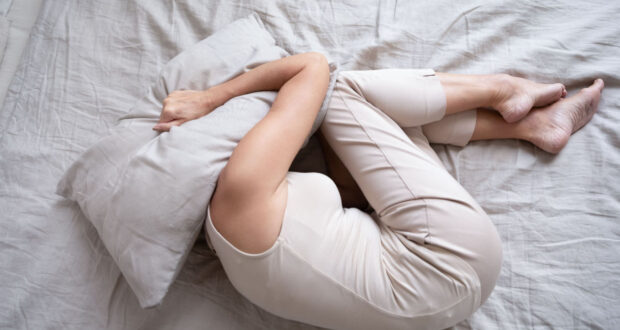By: Red Hot Mamas
Published: May 9, 2023
Dear Red Hot Mamas,
Let’s hope that the upcoming summer months will take a break this year. Last year’s unusual heat and sunshine took a toll on many of us. We had hot flashes, and in addition, we had sleep disturbances.
At menopause, there are a wide range of things that may cause loss of sleep. And if you are one of the women losing sleep, you are not alone. In fact, the National Sleep Foundation found that 40 percent of menopausal women suffer from some type of sleep problem. Lack of sleep makes us more vulnerable to several diseases (high blood pressure, heart disease, diabetes and more).
Some typical happenings with our sleep at menopause: We may have more trouble falling asleep and staying asleep; our sleep may be disturbed by night sweats; we may have more problems going back to sleep once we are awake; we may lose deep sleep; and some of us even wake up to go to the bathroom once or twice at night. So, in essence, we say goodbye to enjoying that solid eight hours of sleep that we once enjoyed. What results is the following day we feel exhausted and fatigued.
Fatigue is a common, distressing problem in menopause. Many women experience a significant lack of energy and tiredness which can lead to irritability, anxiety, stress, mood swings and even lead to depression. Chronic fatigue can make us feel lousy. And, as if menopause doesn’t do enough of a number on our sex life, fatigue can contribute to having sex look like a thing of the past. If our fatigue gets out of control, it can greatly affect relationships with friends, coworkers, and family.
What’s Going On?
As we grow older, our bodies are changing and are working hard to acclimate to diminished hormone levels as well as dealing with the many symptoms associated with menopause. Chances are we’re living our lives as we did prior to menopause (as we should). We are probably carrying the same workload, taking on the same responsibilities and trying to be the power woman as we always have been. Sometimes it is easy to forget that our bodies are in a transition. It may catch up to us in different ways emotionally and physically.
Hormonal changes can have a great effect on the nervous system at menopause. Estrogen is a key element in brain functioning. When our estrogen drops at menopause, many physiological and psychological changes may occur. On top of that, common midlife social changes can cause excessive stress for many of us! Before you know it, we experience stress and anxiety which may lead to insomnia and makes you feel totally drained and exhausted.
Insomnia is one of the major contributors to fatigue. Many reasons may contribute to insomnia at menopause:
- Hot flashes and night sweats
- Declining hormone levels
- Sleep apnea
- Depression and/or anxiety
- Life stressors
- Other health issues (including thyroid problems, pain, urinary incontinence, etc.)
What Can I Do About Feeling Tired All the Time?
Getting a good night’s sleep is the first step. Everyone’s sleep requirements are different. Some people can get along just fine with 5-6 hours of sleep, while others need 10-11 hours to feel their best. However, according to the National Sleep Foundation healthy adults need at least seven hours of sleep each night!
Red Hot Tips to Improve Your Sleep:
- Make sleep a priority. Sleep is essential to helping you perform better mentally and physically, and it may keep you from warding off greater health concerns.
- Try sticking to the same sleep schedule every day.
- Practicing relaxing at bedtime
- Make sure your bedroom is cool, dark, and you have comfortable bedding (pillows and mattress)
- Disconnect all those electronic devices – phones, iPad, computers.
- Monitor your intake of caffeine and alcohol and avoid consumption before you go to bed.
- Record your sleep patterns in a sleep diary and share this with your doctor.
- If you are having significant problems with fatigue, snoring, leg cramps and any other problem preventing you from getting a good night’s sleep, you should consult with your doctor.
Lifestyle changes which may help include:
- Light exercise can fight fatigue. It sounds counter intuitive, right? Well, the best thing we can do for our bodies when we feel tired is exercise! Moderate (discuss with your doctor what level this is for you) and consistent (3-4 times per week) aerobic exercise can give you energy! Just make sure you don’t work out too close to bedtime.
- Don’t eat too much and eat the right food. Healthy, light meals are best. Start your day off right and eat your breakfast to raise your blood sugar level in the morning to boost energy. Don’t forget to hydrate and drink at least 8 glasses of water every day.
- Get a handle on stress. Deep breathing techniques, stress reducing activities like yoga, massage and meditation can revitalize and energize your body. If work is causing you stress, try some of the techniques listed in the opening letter of this newsletter.
- Cut back on coffee and other caffeine. It may make you feel like you’re awake and alert after drinking a big mug of coffee, but after a few hours, it will wear off and make you crash.
In closing, it is important for you to sit down with your doctor to discuss what may be contributing to your fatigue. Your doctor will discuss many options that are available which may help you to feel more energized and refreshed at menopause and beyond.
Good Health to You All,
Karen Giblin
 Red Hot Mamas In Charge of Change.
Red Hot Mamas In Charge of Change.




